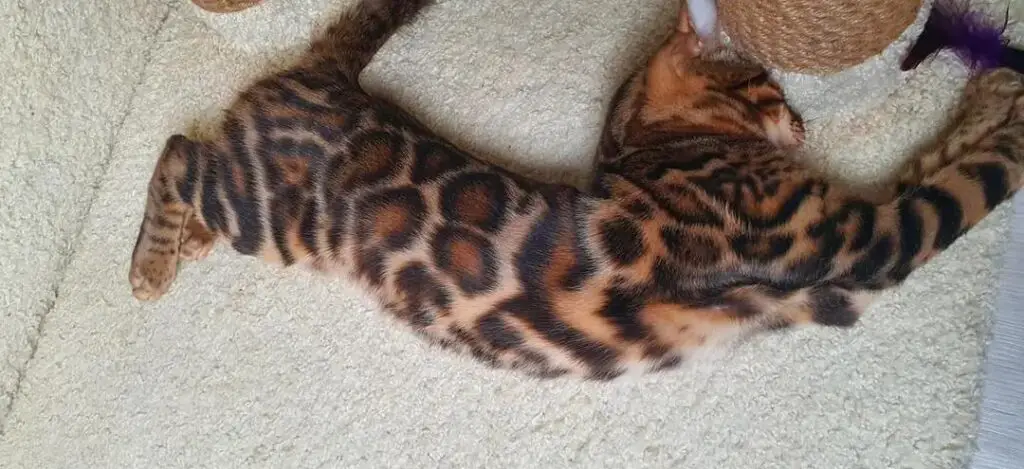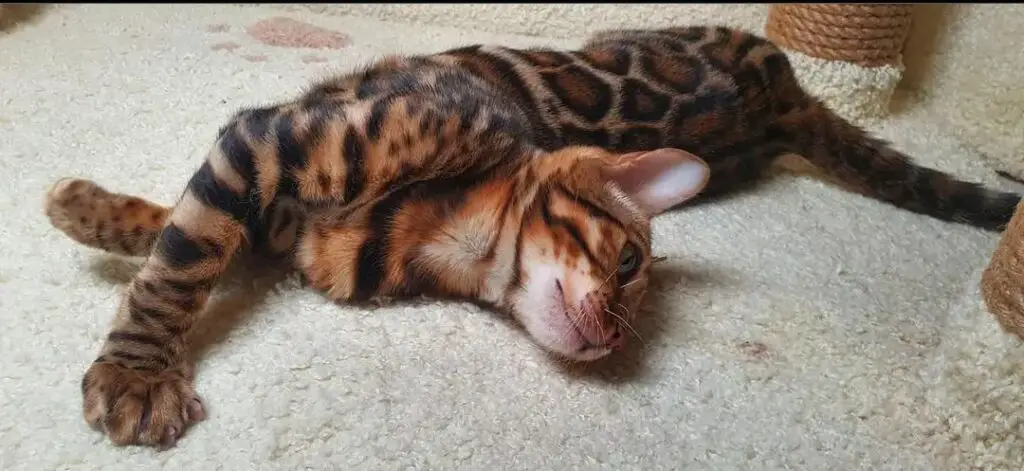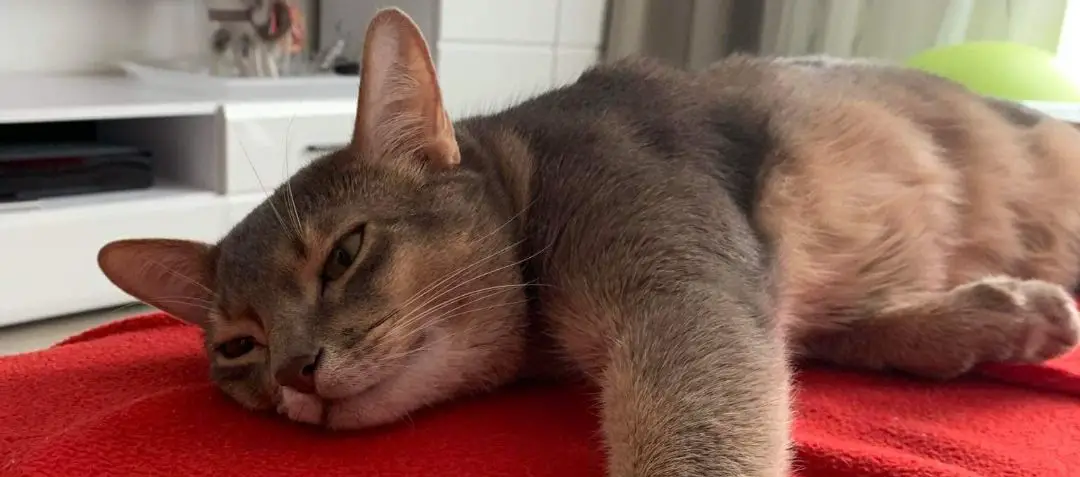Are you tired of being woken up by your restless feline friend in the middle of the night?
Say goodbye to those sleepless nights with my tips on making your cat sleep at night.
From creating a cozy sleeping environment to establishing a bedtime routine, I’ve got you covered for a purr-fect night’s sleep for you and your furry companion.
Let’s get started!
Making Your Cat Sleep at Night Instantly
To make your cat sleep instantly at night, you need to create a comfortable sleeping environment with a designated sleeping spot that is quiet, dark, and free from distractions and use natural remedies like pheromone diffusers or calming sprays to create a soothing atmosphere conducive to sleep.
Annoying Cat Nighttime Behaviors

From my experience living with cats, there are a lot of nighttime cat behaviors that can be annoying to most cat owners which can cause sleepless nights.
Here are some of these annoying nighttime cat behaviors:
- Wild and excited play across you or your furniture
- Nibbling your toes while you sleep
- Attacking your ears while you sleep
- Walking across you while you sleep
- Crying or yowling
- Nibbling or pouncing on the owner’s face
- Digging at your blanket while you are sleeping
- Racing back and forth throughout the room while you sleep
- Scratching at the door while you sleep.
Causes of Active Nighttime Behavior in Cats
In my opinion, there are a lot of causes of active nighttime behavior in cats, which consist of the following:
- Lack of daytime activities
- Late night feeding
- Changes in routine
- Attention reinforcement
- Nocturnal instincts
- Certain health conditions
- Lack of opportunities for exercise and play before bedtime
- Unresolved energy
- Old age
- Stress and anxiety
- The presence of other unfamiliar animals
Let me break this down further now we know why your cat may be awake while it should be sleeping…
How to Make My Cat Sleep at Night

In my opinion as a cat owner, to make your cat sleep at night, you need to establish a consistent bedtime routine that includes interactive playtime to tire them out, create a cozy and comfortable sleeping environment with a soft bed or blanket, and consider providing a quiet and dark space for your feline friend to retreat to, away from any disturbances.
Before nighttime, you should encourage your cat to expend energy during the day through interactive play sessions or puzzle toys to help them feel tired and ready to sleep.
By implementing these measures, you’ll increase the likelihood of your cat enjoying a restful night’s sleep.
With all this in mind, let’s break it down further for a better understanding.
Here are some of the effective ways of making your cat sleep at night:
Create a Calming and Quiet Environment: Select a private and comfortable location for your cat’s sleeping place in order to help it fall asleep at night.
It might be a secluded area within the room or a special cat bed. Make sure it’s not near any noisy objects, such as TVs or appliances.
Your cat will be able to sleep in a more tranquil environment thanks to this. Think about offering them a cozy blanket or bed to curl up in.
Having a nice bed in a designated sleeping area can help cats go to sleep fast since they enjoy snuggly, soft surfaces.
To keep out outside light sources that can keep them up at night, use shades or curtains.
Because cats are light-sensitive, making their environment darker can aid in relaxation and improved sleep.
Establish a Daily Bedtime Routine: Establish a regular sleep pattern for your cat and follow it, this is because they are creatures of habit, and cats love routine.
Try to set a consistent bedtime for your cat and develop a routine that lets them know when it’s time to relax and go to sleep.
Take them on relaxing activities an hour or so before bedtime. This can involve giving them a brush, which not only makes them feel better but also helps you and your cat bond more strongly.
A moderate game in which you use toys that encourage them to chase or swat at objects can also be played with them.
Don’t forget to keep playtime peaceful and low-key. To establish a recognizable and consistent atmosphere, stick to the same schedule every night.
Consistency is key in helping your cat understand that it’s time to sleep. By following the same routine each night, your cat will start associating these activities with bedtime and begin to wind down naturally.
Engage in Playtime and Exercise
Before Bedtime: Play interactive games with your cat before they turn in for the night. As they are innate hunters, cats can let off steam and indulge in natural activities while playing.
Make use of objects that imitate prey, like interactive puzzle toys or feather wands.
To assist them release energy and tire them out, try to get them to play for at least 15 to 20 minutes.
This can involve playing with a toy, jumping on a feather wand, or even light wrestling.
The idea is to stimulate them both mentally and physically so they can unwind and get ready for bed. Try out a few different kinds of toys to see which ones your cat prefers.
Some cats prefer toys that make noise, while others enjoy toys that simulate the movement of prey.
Observe their behavior and adjust accordingly to keep playtime engaging and enjoyable for them.
Dim the Lights and Reduce Noise Around the Sleeping Spot: Reduce the lighting in your cat’s sleeping area to foster a relaxing and tranquil environment.
Bright lights have the potential to be stimulating and disrupt their regular sleep cycles.
Make use of dimmer switches or low-wattage bulbs to create a more tranquil and gentle lighting atmosphere.
To keep out any outside light sources that can impede their ability to sleep, think about installing shades or curtains.
Being crepuscular creatures, cats are most active at dawn and dusk.
Reducing excessive light exposure can help them sleep better by regulating their circadian rhythms.
Minimize any loud noises or other interruptions that could keep them from sleeping.
Close windows to minimize outside sounds, turn off noisy appliances or fans and create a quiet environment.
You can even use white noise machines or calming soundtracks designed specifically for cats to drown out any ambient noise that might keep them awake.
Avoid Feeding Late at Night: In my opinion, a large dinner should not be given to your cat shortly before bed. Having a full stomach might cause discomfort and agitation during the night.
To give them enough time for digestion, serve them a smaller meal a few hours before bedtime.
Consider breaking up your cat’s daily food servings into smaller meals spaced out throughout the day if they have a tendency to get hungry at night.
This guarantees kids have enough energy to go through the night and helps prevent hunger pangs.
See your veterinarian to find the ideal feeding plan and nutrition for your cat if they have digestive problems or a sensitive stomach.
To prevent disturbances during the night, some cats might need to follow certain feeding recommendations.
Try Not to Respond to Demands Unless Necessary: I suggest you try not to give in to your cat’s demands during the night unless they are essential or related to their safety.
Because they are inherently interested, cats could try to play with you or chase you down at night.
Giving in to their demands at night can encourage bad behavior and throw off your sleep schedule.
Provide them with interactive toys, puzzle feeders, or a warm place to curl up to divert their focus to a calm and pleasant area instead.
Make sure your cat gets plenty of playtime and mental stimulation throughout the day if they are a nighttime attention-seeker. This can assist in depleting their energy and lessening their demand for care at night.
Try Using a Plugin Diffuser with Calming Scents: Use a plugin diffuser that emits relaxing aromas, such as chamomile or lavender.
These smells can aid in establishing a calm atmosphere for sleeping and are known to have a calming impact on cats.
Make sure the diffuser is safe for cats, and make sure you follow the manufacturer’s directions.
Make sure the diffuser is out of your cat’s reach and not blowing in their face when you place it in the room where they sleep.

Try Playing Soft Background Music: Similar to people, cats can find solace in calming music. Try out a variety of musical genres to see which ones soothe your cat the most.
While some cats may react well to instrumental music or sounds of nature, others may enjoy classical music.
Reduce the level of the music to create a relaxing atmosphere. Steer clear of any noises or abrupt volume fluctuations that could frighten your cat.
Remember that not every cat will react well to background music.
It’s recommended to stop playing music during your cat’s sleep period if you discover that it doesn’t quiet them down or if they look anxious.
Provide Gentle Affection Before Bedtime: Give your cat some gentle attention during some quality time before they go to sleep. This can be doing light grooming, softly petting them, or petting their fur.
Your cat can feel safe and loved through physical contact and bonding experiences, which will help them feel at ease and relaxed.
Observe your cat’s reactions to affection and body language. If they appear uncomfortable or don’t like a particular kind of contact, respect their space and find other methods to express your love.
Related: Why your cat is whining at night and what to do.
Conclusion
Don’t let your cat’s nocturnal habits keep you up all night! With this advice and simple strategies, you can finally enjoy uninterrupted sleep and a happy, well-rested feline companion. Say goodbye to those midnight meows and hello to peaceful nights filled with sweet dreams for both you and your beloved kitty.
Frequently Asked Questions
Why is my cat so active at night?
Cats are naturally nocturnal animals, meaning they are more active during the night. This behavior is rooted in their hunting instincts and can be influenced by their internal body clock.
How can I create a sleep-friendly environment for my cat?
To create a conducive sleep environment, provide a comfortable bed or sleeping area for your cat, away from distractions and noise. Ensure they have access to a dark and quiet space, as well as a cozy blanket or cat bed.
Should I feed my cat before bedtime?
It’s best to avoid feeding your cat right before bedtime as it can increase their energy levels. Instead, try to establish a feeding routine earlier in the evening, allowing enough time for digestion before sleep.
Can I train my cat to sleep through the night?
While you can’t completely change your cat’s natural nocturnal behavior, you can gradually adjust their routine. Engage them in playtime and interactive toys during the day to help tire them out, creating a better chance for a more restful night’s sleep.









